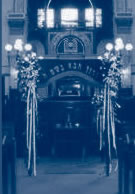|
SEDRA: Pinchas Hertz Chumash p. 686 Numbers
Chap 25
This week's Sedra is generously sponsored by Jeff Degen.
SYNOPSIS:
As a reward for his zeal in defending the honour of G-d, Pinchas
was promised that the Priestly office would be retained by
his descendants as an eternal Covenant of peace.
The Israelites were ordered to prepare for an offensive war
against the Midianites, who had been primarily responsible
for their degradation. Before this would take place, though,
Moses and Elazar the High Priest were told to take a new census
of the populace (the previous census had been taken thirty-eight
years before). Now that the conquest of Canaan was in sight,
it was necessary for Moses to ascertain not only the number
of able-bodied men available for war, but also the numerical
strength of each tribe. This was needed as a basis for dividing
the Promised Land fairly among the tribes. The total number
of male Israelites over the age of twenty, those liable for
military service, came to six hundred and seven thousand,
seven hundred thirty. The extent of the land area to be allotted
to each tribe was to be proportionate to the tribe's size,
and its geographical location was to be decided by lot. The
Levi'im, who would not share in the division of the land,
were counted separately.
Zelophchad, a member of the tribe of Menasheh, had died in
the wilderness, leaving five daughters but no sons. The question
of whether the five daughters could receive their father's
inheritance arose; if not, the portion of land that had been
due to Zelophchad would pass into other hands resulting in
a diminution of the allotment of that tribe. They brought
their case before Moses who submitted it to G-d. The final
ruling was that if a person left no sons, his daughters had
the right to his heritage. It was furthermore declared that
if one left neither sons nor daughters, his property would
go to his surviving brothers, or if there were none, to his
nearest next of kin. The principle that the title to one's
land would remain within the family and within the tribe was
thus established.
G-d commanded Moses to ascend the mountain of Abarim from
where he could view the Promised Land. Told that he was nearing
the end of his days, Moses showed immediate concern for the
continued welfare of the people and asked that his successor
be named. G-d replied that Yehoshua bin Nun would take over
the reigns of leadership and that Moses should lay his hands
upon him to signify the transfer of authority. However, unlike
Moses, who had received guidance directly from the Almighty,
Yehoshua would be guided by Elazar the Kohen Gadol, who would
in turn consult G-d by means of the Urim and Tumim.
The people were reminded that their sacrificial obligations
would continue when they entered Canaan. A detailed description
of the public morning and evening sacrifices were therefore
given. The final section of the Sedra is very familiar to
us since it contains details of the sacrifices for the Festivals.
HAPHTORAH HERTZ CHUMASH P 710 Jeremiah Chap. 1
Although the Sedra is "Pinchas" we read the Haphtorah
of "Matot" since we are now in the three week period
of mourning preceding Tish'a B'av. This chapter is the first
of the three "Haftarot of Rebuke" warning of the
impending tragedy which was to befall Jewish life with the
fall of Jerusalem, the Destruction of the Temple and exile.
In spite of the disaster which looms, Israel will never be
totally rejected by G-d. In most touching and sublime terms
the verses concluding the Haphtorah recall "the affections
of thy youth, the love of thine espousals. How thou wentest
after Me in the wilderness, in a land that was not sown".
TELL ME RABBI .....CONCENTRATION IN PRAYER FROM THE NOVELLAE
OF RABBI HAYYIM OF BRISK
"There are five things whose absence disqualifies prayer:
... purity of the hands, proper clothing, purity of the place...and
concentration of the mind...Prayer without concentration is
no prayer. If one has prayed without concentration, one must
pray again with concentration. If one finds oneself in a state
of distraction or agitation one may not pray until one's mind
is settled." (Maimonides. Hil. Tefillah 4:1, 15)
In Chapter 4 quoted above, Maimonides seems to refer to the
whole of the "prayer" (i.e, Shmoneh Esreh the Eighteen
Benedictions) and that if any part of it was said without
proper concentration the whole is invalid.
However, this seems to contradict what he writes in Chapter
10: "If one has prayed without concentration, one must
pray again with concentration; but if one has concentrated
while saying the first blessing (of the Eighteen) one is not
required to pray again."(Maimonides, Hil. Tefillah: 10:1)
Here concentration is an essential requirement only for the
first blessing, and not for the whole prayer. It would appear
that there are two kinds of concentration required for prayer:
(a) Concentration on the meaning of the words one is saying,
ie. understanding .
(b) The awareness that one is standing in prayer before G-d,
ie. awe
This second sense is clarified by Maimonides: "What does
concentration mean (as awe)? That one should clear one's mind
of all (extraneous) thoughts and see oneself as standing before
the presence of G-d." (Maimonides, Hil. Tefillah, 4:16)
Concentration as Awe is not a mere requirement for prayer,
such as purity of hands or proper clothing , but an essential
ingredient in the act of prayer itself. If one's mind is not
clear and one does not see oneself as standing before G-d
and praying to Him, one is not engaged in the act of prayer
at all.
This is an example of a mindless act which, throughout the
Torah, is not considered an act at all.
This is why concentration (as Awe) in this sense is essential
throughout the prayer. The prayer where this concentration
was lacking has effectively not been prayed. But if someone
is aware he is engaged in prayer (Awe), but does not realise
the meaning of the words he is saying (understanding), the
minimum requirement is satisfied if the first blessing is
said with awareness of the meaning of the words.
So, awareness of standing before G-d (Awe) establishes the
prayer as a prayer, but there is an additional requirement
that, so far as possible, prayers should be said with full
understanding.
However, where one finds this (understanding) impossible,
the Talmud (Berachot 34b) makes it essential only for the
first blessing. Another essential ingredient in prayer, as
in all mitzvot, is the intention to do the act as a mitzvah,
ie. as an act commanded by G-d. This intention is also required
for the whole of the prayer and is an essential part of the
concentration.
So when we come to Shule the conditions for prayer (The Amidah)
are:
(a) Constant concentration and awareness we are in G-d's Presence
("Know before Whom You Stand").
(b) Constant concentration on the fact that praying is a Mitzvah
(c) Understanding the meaning of our words, at least for the
first blessing and more or all, if possible. Thus there is
a value for those who are as yet unskilled in prayer to be
present in Shule. However, to encompass all aspects of prayer,
understanding becomes essential. This can only be attained
through dedication to learning.
BACK TO SHABBAT SHALOM
TABLE
|








